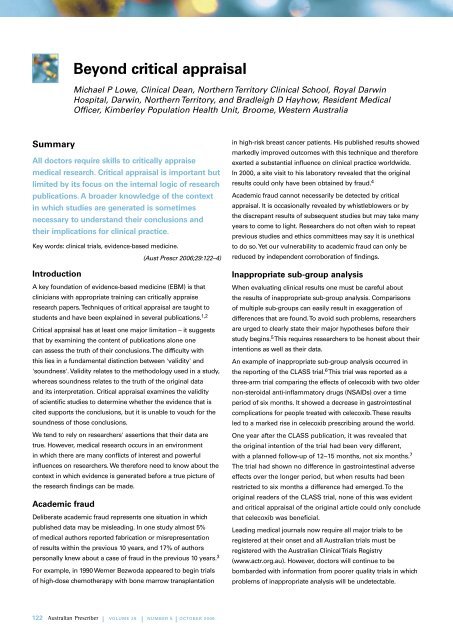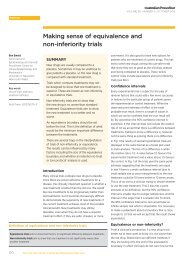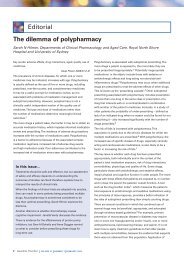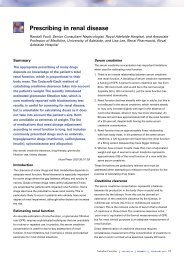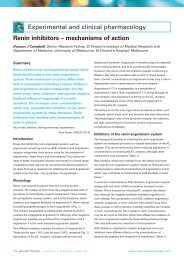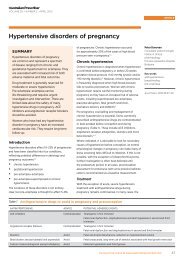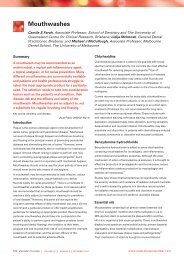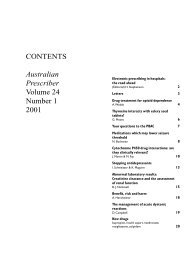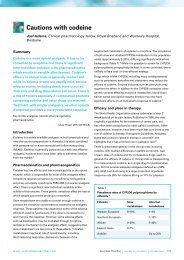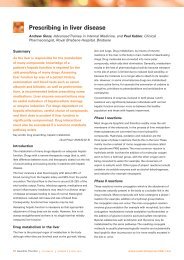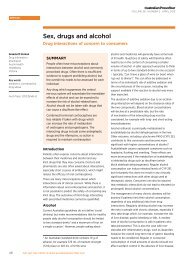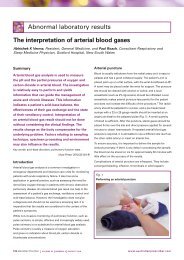download the full PDF issue - Australian Prescriber
download the full PDF issue - Australian Prescriber
download the full PDF issue - Australian Prescriber
You also want an ePaper? Increase the reach of your titles
YUMPU automatically turns print PDFs into web optimized ePapers that Google loves.
Summary<br />
Beyond critical appraisal<br />
Michael P Lowe, Clinical Dean, Nor<strong>the</strong>rn Territory Clinical School, Royal Darwin<br />
Hospital, Darwin, Nor<strong>the</strong>rn Territory, and Bradleigh D Hayhow, Resident Medical<br />
Officer, Kimberley Population Health Unit, Broome, Western Australia<br />
All doctors require skills to critically appraise<br />
medical research. Critical appraisal is important but<br />
limited by its focus on <strong>the</strong> internal logic of research<br />
publications. A broader knowledge of <strong>the</strong> context<br />
in which studies are generated is sometimes<br />
necessary to understand <strong>the</strong>ir conclusions and<br />
<strong>the</strong>ir implications for clinical practice.<br />
Key words: clinical trials, evidence-based medicine.<br />
Introduction<br />
(Aust Prescr 2006;29:122–4)<br />
A key foundation of evidence-based medicine (EBM) is that<br />
clinicians with appropriate training can critically appraise<br />
research papers. Techniques of critical appraisal are taught to<br />
students and have been explained in several publications. 1,2<br />
Critical appraisal has at least one major limitation – it suggests<br />
that by examining <strong>the</strong> content of publications alone one<br />
can assess <strong>the</strong> truth of <strong>the</strong>ir conclusions. The difficulty with<br />
this lies in a fundamental distinction between 'validity' and<br />
'soundness'. Validity relates to <strong>the</strong> methodology used in a study,<br />
whereas soundness relates to <strong>the</strong> truth of <strong>the</strong> original data<br />
and its interpretation. Critical appraisal examines <strong>the</strong> validity<br />
of scientific studies to determine whe<strong>the</strong>r <strong>the</strong> evidence that is<br />
cited supports <strong>the</strong> conclusions, but it is unable to vouch for <strong>the</strong><br />
soundness of those conclusions.<br />
We tend to rely on researchers' assertions that <strong>the</strong>ir data are<br />
true. However, medical research occurs in an environment<br />
in which <strong>the</strong>re are many conflicts of interest and powerful<br />
influences on researchers. We <strong>the</strong>refore need to know about <strong>the</strong><br />
context in which evidence is generated before a true picture of<br />
<strong>the</strong> research findings can be made.<br />
Academic fraud<br />
Deliberate academic fraud represents one situation in which<br />
published data may be misleading. In one study almost 5%<br />
of medical authors reported fabrication or misrepresentation<br />
of results within <strong>the</strong> previous 10 years, and 17% of authors<br />
personally knew about a case of fraud in <strong>the</strong> previous 10 years. 3<br />
For example, in 1990 Werner Bezwoda appeared to begin trials<br />
of high-dose chemo<strong>the</strong>rapy with bone marrow transplantation<br />
122 | VOLUME 29 | NUMBER 5 | OCTOBER 2006<br />
in high-risk breast cancer patients. His published results showed<br />
markedly improved outcomes with this technique and <strong>the</strong>refore<br />
exerted a substantial influence on clinical practice worldwide.<br />
In 2000, a site visit to his laboratory revealed that <strong>the</strong> original<br />
results could only have been obtained by fraud. 4<br />
Academic fraud cannot necessarily be detected by critical<br />
appraisal. It is occasionally revealed by whistleblowers or by<br />
<strong>the</strong> discrepant results of subsequent studies but may take many<br />
years to come to light. Researchers do not often wish to repeat<br />
previous studies and ethics committees may say it is unethical<br />
to do so. Yet our vulnerability to academic fraud can only be<br />
reduced by independent corroboration of findings.<br />
Inappropriate sub-group analysis<br />
When evaluating clinical results one must be careful about<br />
<strong>the</strong> results of inappropriate sub-group analysis. Comparisons<br />
of multiple sub-groups can easily result in exaggeration of<br />
differences that are found. To avoid such problems, researchers<br />
are urged to clearly state <strong>the</strong>ir major hypo<strong>the</strong>ses before <strong>the</strong>ir<br />
study begins. 5 This requires researchers to be honest about <strong>the</strong>ir<br />
intentions as well as <strong>the</strong>ir data.<br />
An example of inappropriate sub-group analysis occurred in<br />
<strong>the</strong> reporting of <strong>the</strong> CLASS trial. 6 This trial was reported as a<br />
three-arm trial comparing <strong>the</strong> effects of celecoxib with two older<br />
non-steroidal anti-inflammatory drugs (NSAIDs) over a time<br />
period of six months. It showed a decrease in gastrointestinal<br />
complications for people treated with celecoxib. These results<br />
led to a marked rise in celecoxib prescribing around <strong>the</strong> world.<br />
One year after <strong>the</strong> CLASS publication, it was revealed that<br />
<strong>the</strong> original intention of <strong>the</strong> trial had been very different,<br />
with a planned follow-up of 12−15 months, not six months. 7<br />
The trial had shown no difference in gastrointestinal adverse<br />
effects over <strong>the</strong> longer period, but when results had been<br />
restricted to six months a difference had emerged. To <strong>the</strong><br />
original readers of <strong>the</strong> CLASS trial, none of this was evident<br />
and critical appraisal of <strong>the</strong> original article could only conclude<br />
that celecoxib was beneficial.<br />
Leading medical journals now require all major trials to be<br />
registered at <strong>the</strong>ir onset and all <strong>Australian</strong> trials must be<br />
registered with <strong>the</strong> <strong>Australian</strong> Clinical Trials Registry<br />
(www.actr.org.au). However, doctors will continue to be<br />
bombarded with information from poorer quality trials in which<br />
problems of inappropriate analysis will be undetectable.


